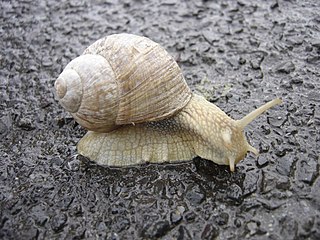
A snail is, in loose terms, a shelled gastropod. The name is most often applied to land snails, terrestrial pulmonate gastropod molluscs. However, the common name snail is also used for most of the members of the molluscan class Gastropoda that have a coiled shell that is large enough for the animal to retract completely into. When the word "snail" is used in this most general sense, it includes not just land snails but also numerous species of sea snails and freshwater snails. Gastropods that naturally lack a shell, or have only an internal shell, are mostly called slugs, and land snails that have only a very small shell are often called semi-slugs.

The grove snail, brown-lipped snail or Lemon snail is a species of air-breathing land snail, a terrestrial pulmonate gastropod mollusc.
Punctum, plural puncta, adjective punctate, is an anatomical term for a sharp point or tip. It may also refer to:

Sea snail is a common name for slow moving marine gastropod molluscs usually with visible external shells, such as whelk or abalone. They share the taxonomic class Gastropoda with slugs, which are distinguished from snails primarily by the absence of a visible shell.

A land snail is any of the numerous species of snail that live on land, as opposed to the sea snails and freshwater snails. Land snail is the common name for terrestrial gastropod mollusks that have shells. However, it is not always easy to say which species are terrestrial, because some are more or less amphibious between land and fresh water, and others are relatively amphibious between land and salt water.

Camaenidae is a family of air-breathing land snails, terrestrial pulmonate gastropod mollusks in the superfamily Helicoidea, the typical snails and their allies. This is one of the most diverse families in the clade Stylommatophora.
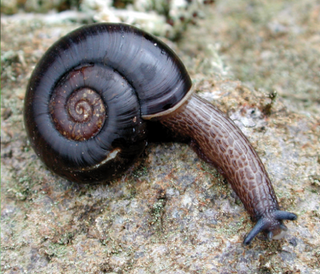
Haplotrematidae is a taxonomic family of predatory air-breathing land snails, terrestrial pulmonate gastropod mollusks in the superfamily Haplotrematoidea.
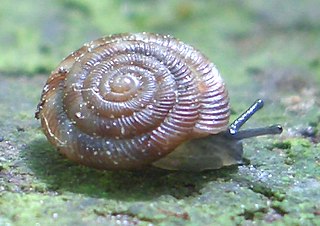
Discus rotundatus, common name rotund disc, is a species of small, air-breathing, land snail, a terrestrial pulmonate gastropod mollusk in the family Discidae, the disk snails.
Allium punctum is a species of wild onion known by the common name dotted onion or Modoc onion. It is native to the western United States in and around the Modoc Plateau in northeastern California, northwestern Nevada, and southeastern Oregon. It is uncommon, growing volcanic flatlands created by old lava flows.
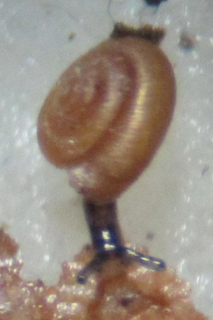
Punctidae, common name the "dot snails", is a family of minute air-breathing land snails, terrestrial pulmonate gastropod mollusks or micromollusks in the informal group Sigmurethra.

Punctum pygmaeum is a species of very small, air-breathing land snail, a terrestrial pulmonate gastropod mollusk in the family Punctidae, the dot snails.

Punctum is a genus of very small air-breathing land snails, terrestrial pulmonate gastropod mollusks or micromollusks in the family Punctidae, the dot snails.

Freshwater snails are gastropod mollusks which live in fresh water. There are many different families. They are found throughout the world in various habitats, ranging from ephemeral pools to the largest lakes, and from small seeps and springs to major rivers. The great majority of freshwater gastropods have a shell, with very few exceptions. Some groups of snails that live in freshwater respire using gills, whereas other groups need to reach the surface to breathe air. In addition, some are amphibious and have both gills and a lung. Most feed on algae, but many are detritivores and some are filter feeders.
George Alan Solem, known professionally as Alan Solem, was an American malacologist, a biologist who studied mollusks.

Punctum minutissimum is a species of minute air-breathing land snail, a terrestrial pulmonate gastropod mollusk in the family Punctidae, the dot snails.

Punctum blandianum is a species of minute air-breathing land snail, a terrestrial pulmonate gastropod mollusk in the family Punctidae, the dot snails.

Terebra punctum is a species of sea snail, a marine gastropod mollusk in the family Terebridae, the auger snails.
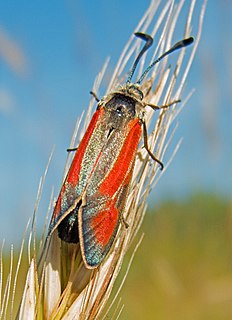
Zygaena punctum is a species of moth in the family Zygaenidae. It is found in Poland, the Czech Republic, Slovakia, Austria, Slovenia, Italy, the Balkan Peninsula, Moldova, Ukraine, Russia and Turkey.

Terrestrial molluscs or land molluscs (mollusks) are an ecological group that includes all molluscs that live on land in contrast to freshwater and marine molluscs.














